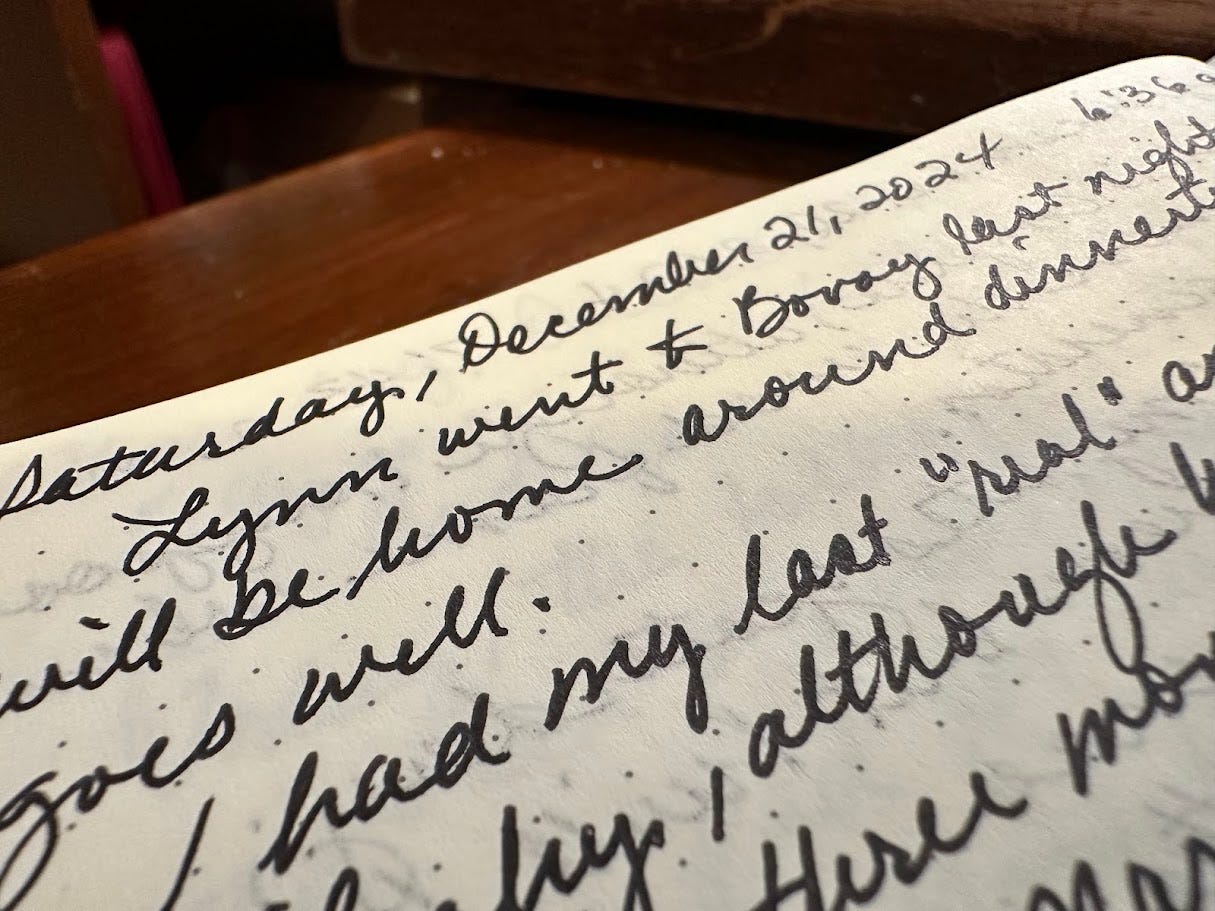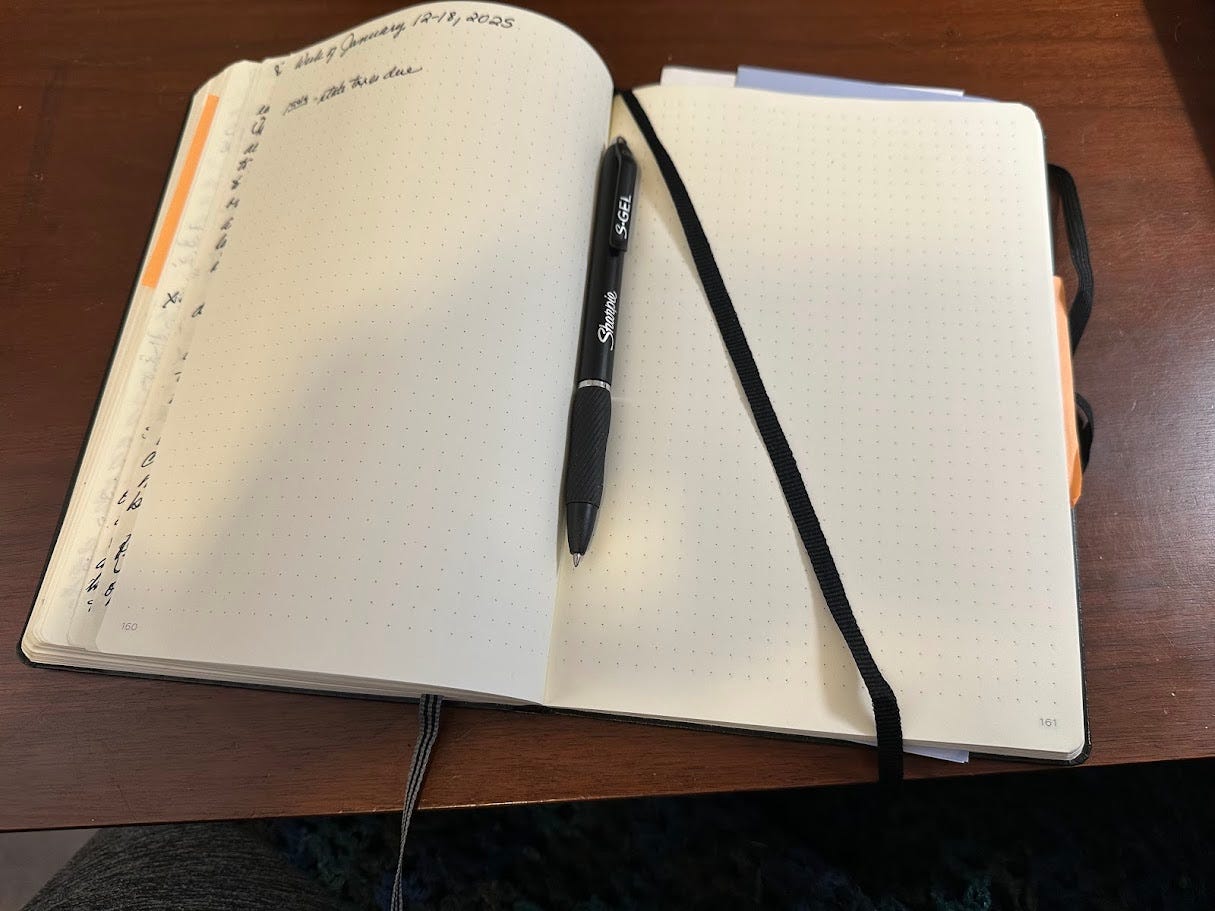Journaling: Your Personal Time Machine & Path to the Future
Part 1 of a 4-part series about journaling for writers
Trigger warning: Death of a loved one.
I thought I knew myself pretty well until I started journaling consistently.
The simple daily practice of journaling turned into a journey of self-discovery.
I gained unexpected insights through reflection, found hidden patterns in my life, and learned more about myself and what I believe.
Journaling shapes the future by giving you a better understanding of the past and present.
Journaling is like having a personal time machine.
While my father was in the process of dying from dementia and heart disease last summer, I continued my daily journaling habit, unaware of how much it was going to help me through a traumatic event in my life.
Journaling enabled me to see what was happening to Dad before my mother and my sister discerned it; through the daily entries, I recorded his decline. As I wrote day by day, his path and mine grew clearer.
Now, I can travel back in time on any given day to rediscover memories and put them in perspective.
My Tip: Put Limits on Your Entry Space
Each morning, I write one page in my journal (two pages on Saturday), and I capture highlights of what happened the day before. The limits are important, but more about that in a minute.
Journaling Puts You on the Path to Self-Discovery
Dad's final month started with a typical urinary tract infection, but what seemed like a "normal" health struggle was actually a life-or-death matter.
My journal entries alerted me to what was in store.
For example, my father started talking about his mother, bringing her up often in conversation.
Mom brought in her portrait, and he was beyond thrilled to see it.
He talked about his adventures as a boy and about his teenage years in Carlsbad, New Mexico.
Due to his dementia, Dad could tell you his childhood address but not his current one. What a bittersweet realization that was!
These newly unearthed memories were a clue that he was near the end of his journey; talking about (or to) long-dead relatives is a natural thing dying people do.
Past Becomes Future
While Dad was reconnecting with his past, he was building a bridge to his future.
The truth became clear; he was about to leave us. Moreover, Dad wanted to die. He wanted to go on to whatever is next. He longed to join those who had gone before him.
Through recording Dad's declining condition, I gained discernment and acceptance. The future seemed clear, although the timing was still uncertain.
My father passed away a month after he first entered the hospital, and by that time, his death came as no surprise to me. It seemed inevitable and natural, and I felt better prepared for him to leave us behind.
That was a time of strong emotions for all of us, but I felt like I had processed my grief ahead of time, if that makes sense, because I had written down the signs.
My dad was a good father, and I will always miss him. However, I am grateful that he finally got his wish to rest in peace.
Not every situation is life-or-death, but journaling enables discernment and is a great path to self-discovery.
How I Made Journaling Easy for Myself
My Excuse for Irregular Journaling May Sound Familiar
Before I learned the trick to daily journaling, my infrequent entries often took up multiple pages in my notebook and multiple hours to write.
Journaling was unrewarding because it left sizable gaps in the story of my life. Like looking through a cloudy mirror, I could see only fragments of the most important story I needed to write—my own.
My go-to excuse was that I didn't have time to write for myself. And I was right; I didn't have hours to spend on journaling every week. Days and weeks would lapse between entries.
My Empowering Ah-hah Moment
Then I had an ah-ha moment: put strict limits on entry space so there would be no excuse for skipping entries.
Setting a one-page limit works superbly well. One page allows about two hundred fifty words, and I can scratch that out in ten to fifteen minutes. Now, writing daily entries is easy to do, and I have made a habit to journal first thing every morning.
This one-page process gives me an instantly edited overview of life because the cream usually rises to the top; in practice, only the most important stuff makes it onto the page.
On Saturdays, I write two pages, and that stratagem makes the daily pages in my Leuchtturm1917 classic notebook come out to an even number.
BTW, I don't earn a commission from Leuchtturm1917; their notebooks stand up to lots of abuse, and ink from my Sharpie 0.7 S-Gel pen doesn't leak through the pages. Highly recommended.
First in a Series
That's it for today. This is the first installment in a four-part series about journaling for writers. Check back next week for "Journaling for Writers: Unearth Deeper Self-Awareness."
Question of the week: Tell me how you feel about journaling. Describe your process. If you don't journal, what's your biggest obstacle?





